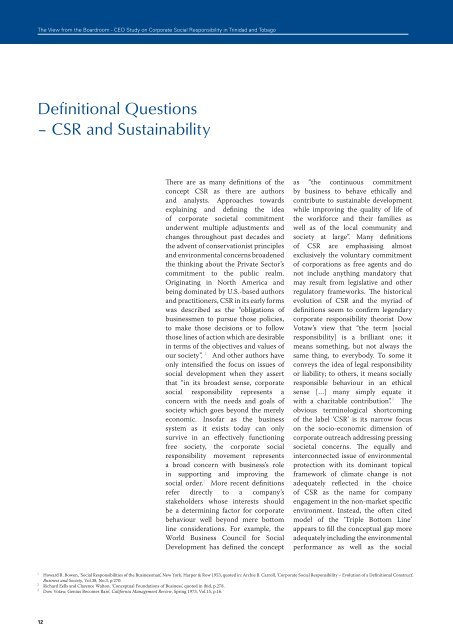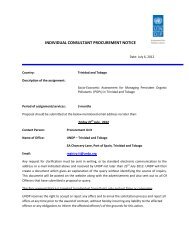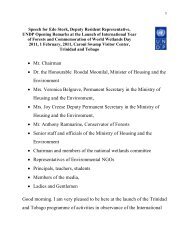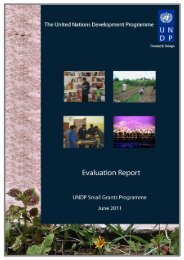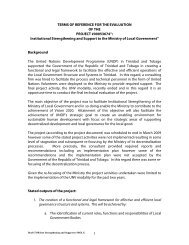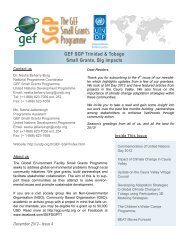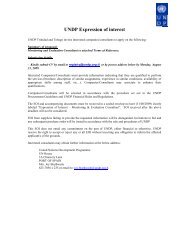The View from the Boardroom - UNDP Trinidad and Tobago
The View from the Boardroom - UNDP Trinidad and Tobago
The View from the Boardroom - UNDP Trinidad and Tobago
Create successful ePaper yourself
Turn your PDF publications into a flip-book with our unique Google optimized e-Paper software.
<strong>The</strong> <strong>View</strong> <strong>from</strong> <strong>the</strong> <strong>Boardroom</strong> - CEO Study on Corporate Social Responsibility in <strong>Trinidad</strong> <strong>and</strong> <strong>Tobago</strong>Definitional Questions– CSR <strong>and</strong> Sustainability<strong>The</strong>re are as many definitions of <strong>the</strong>concept CSR as <strong>the</strong>re are authors<strong>and</strong> analysts. Approaches towardsexplaining <strong>and</strong> defining <strong>the</strong> ideaof corporate societal commitmentunderwent multiple adjustments <strong>and</strong>changes throughout past decades <strong>and</strong><strong>the</strong> advent of conservationist principles<strong>and</strong> environmental concerns broadened<strong>the</strong> thinking about <strong>the</strong> Private Sector’scommitment to <strong>the</strong> public realm.Originating in North America <strong>and</strong>being dominated by U.S.-based authors<strong>and</strong> practitioners, CSR in its early formswas described as <strong>the</strong> “obligations ofbusinessmen to pursue those policies,to make those decisions or to followthose lines of action which are desirablein terms of <strong>the</strong> objectives <strong>and</strong> values ofour society”. 1 And o<strong>the</strong>r authors haveonly intensified <strong>the</strong> focus on issues ofsocial development when <strong>the</strong>y assertthat “in its broadest sense, corporatesocial responsibility represents aconcern with <strong>the</strong> needs <strong>and</strong> goals ofsociety which goes beyond <strong>the</strong> merelyeconomic. Insofar as <strong>the</strong> businesssystem as it exists today can onlysurvive in an effectively functioningfree society, <strong>the</strong> corporate socialresponsibility movement representsa broad concern with business’s rolein supporting <strong>and</strong> improving <strong>the</strong>social order. 2 More recent definitionsrefer directly to a company’sstakeholders whose interests shouldbe a determining factor for corporatebehaviour well beyond mere bottomline considerations. For example, <strong>the</strong>World Business Council for SocialDevelopment has defined <strong>the</strong> conceptas “<strong>the</strong> continuous commitmentby business to behave ethically <strong>and</strong>contribute to sustainable developmentwhile improving <strong>the</strong> quality of life of<strong>the</strong> workforce <strong>and</strong> <strong>the</strong>ir families aswell as of <strong>the</strong> local community <strong>and</strong>society at large”. Many definitionsof CSR are emphasising almostexclusively <strong>the</strong> voluntary commitmentof corporations as free agents <strong>and</strong> donot include anything m<strong>and</strong>atory thatmay result <strong>from</strong> legislative <strong>and</strong> o<strong>the</strong>rregulatory frameworks. <strong>The</strong> historicalevolution of CSR <strong>and</strong> <strong>the</strong> myriad ofdefinitions seem to confirm legendarycorporate responsibility <strong>the</strong>orist DowVotaw’s view that “<strong>the</strong> term [socialresponsibility] is a brilliant one; itmeans something, but not always <strong>the</strong>same thing, to everybody. To some itconveys <strong>the</strong> idea of legal responsibilityor liability; to o<strong>the</strong>rs, it means sociallyresponsible behaviour in an ethicalsense […] many simply equate itwith a charitable contribution”. 3 <strong>The</strong>obvious terminological shortcomingof <strong>the</strong> label ‘CSR’ is its narrow focuson <strong>the</strong> socio-economic dimension ofcorporate outreach addressing pressingsocietal concerns. <strong>The</strong> equally <strong>and</strong>interconnected issue of environmentalprotection with its dominant topicalframework of climate change is notadequately reflected in <strong>the</strong> choiceof CSR as <strong>the</strong> name for companyengagement in <strong>the</strong> non-market specificenvironment. Instead, <strong>the</strong> often citedmodel of <strong>the</strong> ‘Triple Bottom Line’appears to fill <strong>the</strong> conceptual gap moreadequately including <strong>the</strong> environmentalperformance as well as <strong>the</strong> social1 Howard R. Bowen, ‘Social Responsibilities of <strong>the</strong> Businessman’, New York, Harper & Row 1953, quoted in: Archie B. Carroll, ‘Corporate Social Responsibility – Evolution of a Definitional Construct’,Business <strong>and</strong> Society, Vol.38, No.3, p.270.2 Richard Eells <strong>and</strong> Clarence Walton, ‘Conceptual Foundations of Business’, quoted in ibid, p.278.3 Dow Votaw, Genius Becomes Rare’, California Management Review, Spring 1973, Vol.15, p.16.12


